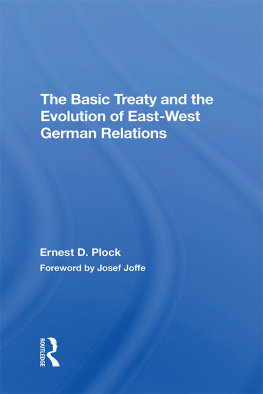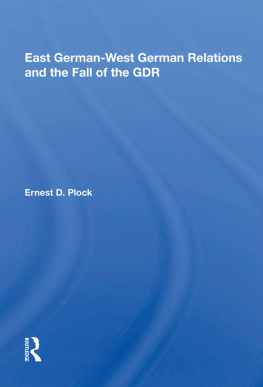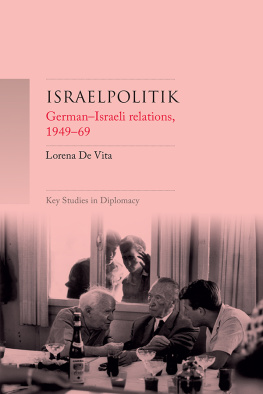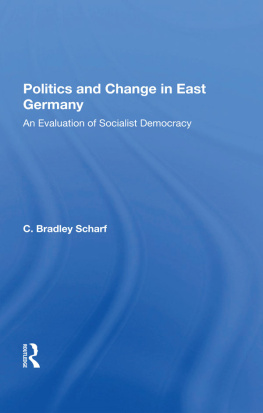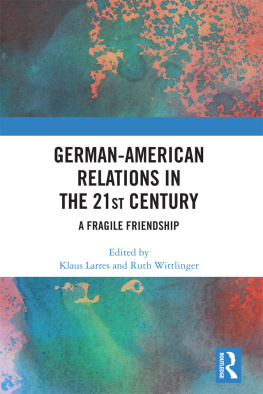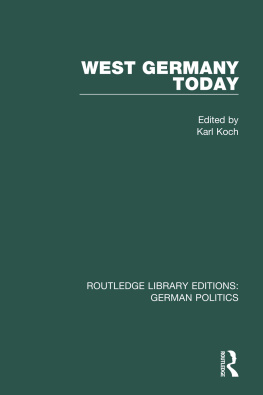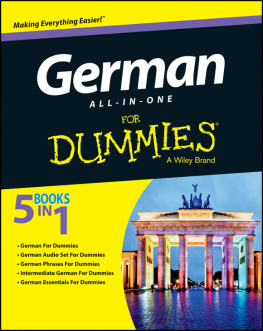The Basic Treaty and the Evolution of East-West German Relations
Westview Special Studies
The concept of Westview Special Studies is a response to the continuing crisis in academic and informational publishing. Library budgets are being diverted from the purchase of books and used for data banks, computers, micromedia, and other methods of information retrieval. Interlibrary loan structures further reduce the edition sizes required to satisfy the needs of the scholarly community. Economic pressures on university presses and the few private scholarly publishing companies have greatly limited the capacity of the industry to properly serve the academic and research communities. As a result, many manuscripts dealing with important subjects, often representing the highest level of scholarship, are no longer economically viable publishing projects--or, if accepted for publication, are typically subject to lead times ranging from one to three years.
Westview Special Studies are our practical solution to the problem. As always, the selection criteria include the importance of the subject, the work's contribution to scholarship, and its insight, originality of thought, and excellence of exposition. We accept manuscripts in camera ready form, typed, set, and word processed according to specifications laid out in our comprehensive manual, which contains straightforward instructions and sample pages. The responsibility for editing and proofreading lies with the author or sponsoring institution, but our editorial staff is always available to answer questions and provide guidance.
The result is a book printed on acid-free paper and bound in sturdy, library-quality soft covers. We manufacture these books ourselves using equipment that does not require a lengthy make-ready process and that allows us to publish first editions of 300 to 1000 copies and to reprint even smaller quantities as needed. Thus, we can produce Special Studies quickly and can keep even very specialized books in print as long as there is a demand for them.
About the Book and Author
The Basic Treaty between the Federal Republic of Germany (FRG) and the German Democratic Republic (GDR) for the first time provided a framework for the exchange of permanent missions and laid the foundation for expanded bilateral cooperation between the two German states. This book charts the progress of inner-German relations in the formative years of the 1970's and explains how the revival of the German question in the 1980's followed from striking changes in East and West German priorities and policies. Dr. Plock assesses the degree of practical cooperation in such areas as trade, travel, and the exchange of media representatives and also indentifies the impact of Soviet interests on the inner-German relationship.
Dr. Plock notes that despite a clear upgrading in FRG-GDR relations under Chancellors Willy Brandt and Helmut Schmidt, inner-German progress continues to be hostage to the overall East-West political and security climate. Yet the author sees a bipartisan West German commitment to partnership with the GDR as well as East Berlin's pragmatic approach to the relationship as stabilizing features of the European political landscape, even though the goals of future "Deutschlandpolitik" will continue to remain ill-defined.
Ernest D. Plock received his Ph.D. in international studies from The American University, Washington, D.C., where he was instructor of several world politics courses and a lecturer on West German domestic and foreign policy. Dr. Plock is currently employed by the International Trade Administration of the U.S. Department of Commerce.
The Basic Treaty and the Evolution of East-West German Relations
Ernest D. Plock
Foreword by Josef Joffe
First published 1986 by Westview Press, Inc.
Published 2019 by Routledge
52 Vanderbilt Avenue, New York, NY 10017
2 Park Square, Milton Park, Abingdon, Oxon OX14 4RN
Routledge is an imprint of the Taylor & Francis Group, an informa business
Copyright 1986 Taylor & Francis
All rights reserved. No part of this book may be reprinted or reproduced or utilised in any form or by any electronic, mechanical, or other means, now known or hereafter invented, including photocopying and recording, or in any information storage or retrieval system, without permission in writing from the publishers.
Notice:
Product or corporate names may be trademarks or registered trademarks, and are used only for identification and explanation without intent to infringe.
Library of Congress Cataloging in Publication Data
Plock, Ernest D.
The basic treaty and the evolution of East-West German
relations.
(Westview special studies in international relations)
Bibliography: p.
Includes index.
1. Germany (West)--Foreign relations--Germany (East)
2. Germany (East)--Foreign relations--Germany (West)
3. World politics--1945- . I. Title. II. Series.
DD258.85.G35P56 1986 327.430431 85-31524
ISBN 13: 978-0-367-29029-0 (hbk)
Sustaining work on the following pages called for support and assistance at a variety of levels. I hope that I have fully acknowledged those who offered ideas, provided useful criticisms, and extended moral support for the undertaking.
Central to this examination of inner-German relations was William C. Cromwell, to whom I am indebted not only for stimulating the initial path of inquiry but for travelling the extra mile in reviewing the text and providing practical suggestions. Special thanks go to Josef Joffe, who devoted valuable time to critiquing the original manuscript and in his foreword placed the two German states' relations in their proper historical context. Steven I. Levine's solicitude and encouragement were also priceless ingredients over the long haul. My own interest in the subject was greatly sustained by discussions with Bruno F. Steinbruckner and his intuitive understanding of Germany past and present, while Margrit Krewson's readiness to talk was a beacon in difficult times.
Pursuing research on this side of the Atlantic would have been quite handicapped without the help of Dr. Gisela Ruess of the Ministry for Inner-German Relations in Bonn, who answered all requests completely and without delay. In addition, Tom Southall's eagerness to help in the preparation of the manuscript and retrieval of information was invaluable, as was the assistance of Robert L. Beckman. To Carmine D'Aloisio, M. Andre Dumont, Joe Keddell, Mohammed Kharabi, Juliette G. Tahar, and Thomas Alexander Vadakevetil, I am grateful for preventing my descent into total selfimposed isolation. Proper credit should go to Eugene V. and Ruth Plock, as well as Bill, Carl, Dwight, and Gary Plock; Bruce and Elaine Tasch were also welcome companions, while my good friend Brooke Beyerle stayed the course with detachment and irreverence.
Finally, this study was greatly aided by several others well acquainted with the complexities of German politics. Dr. Gerhard Wettig, in particular, faithfully critiqued the historical sections of the book and provided a wealth of factual information. Numerous useful comments by F. Gunther Eyck and Leroy Miller influenced my outlook on the subject. It was my especially good fortune to make the acquaintance of German Television Network ARD's Fritz Pleitgen, who kindly consented to several interviews that gave a human perspective to complex political developments.

